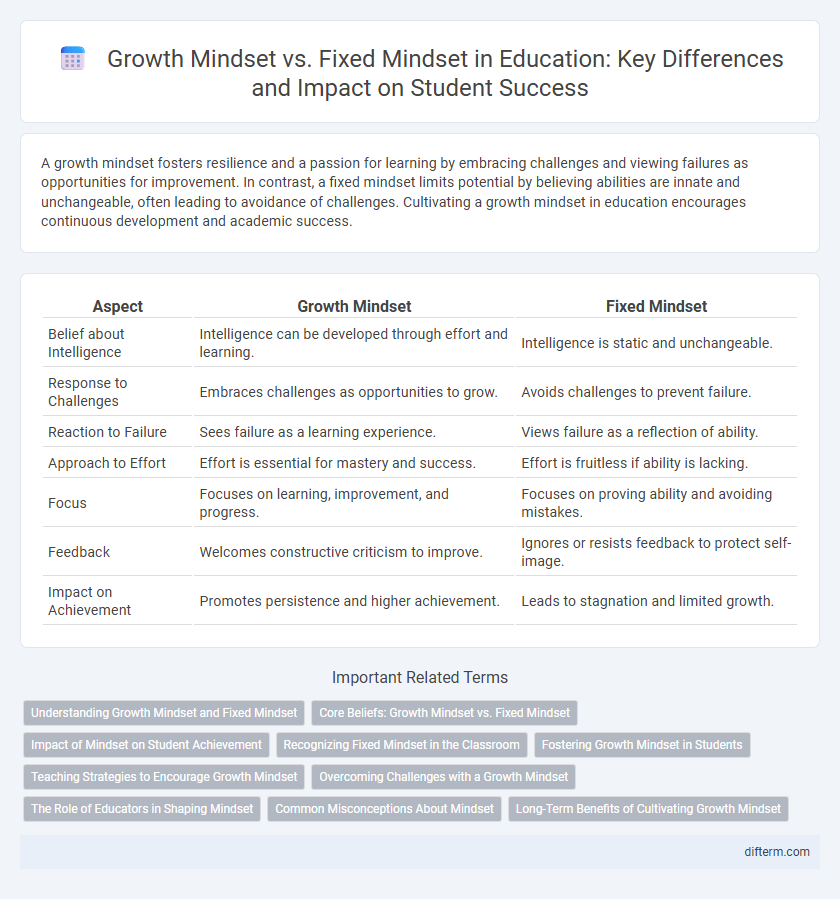A growth mindset fosters resilience and a passion for learning by embracing challenges and viewing failures as opportunities for improvement. In contrast, a fixed mindset limits potential by believing abilities are innate and unchangeable, often leading to avoidance of challenges. Cultivating a growth mindset in education encourages continuous development and academic success.
Table of Comparison
| Aspect | Growth Mindset | Fixed Mindset |
|---|---|---|
| Belief about Intelligence | Intelligence can be developed through effort and learning. | Intelligence is static and unchangeable. |
| Response to Challenges | Embraces challenges as opportunities to grow. | Avoids challenges to prevent failure. |
| Reaction to Failure | Sees failure as a learning experience. | Views failure as a reflection of ability. |
| Approach to Effort | Effort is essential for mastery and success. | Effort is fruitless if ability is lacking. |
| Focus | Focuses on learning, improvement, and progress. | Focuses on proving ability and avoiding mistakes. |
| Feedback | Welcomes constructive criticism to improve. | Ignores or resists feedback to protect self-image. |
| Impact on Achievement | Promotes persistence and higher achievement. | Leads to stagnation and limited growth. |
Understanding Growth Mindset and Fixed Mindset
Understanding growth mindset involves recognizing the belief that abilities and intelligence can be developed through dedication and hard work, promoting resilience and continuous learning. In contrast, a fixed mindset is characterized by the perception that talents and intelligence are innate and unchangeable, often leading to avoidance of challenges and fear of failure. Emphasizing growth mindset in education fosters motivation, adaptability, and a positive approach toward overcoming obstacles.
Core Beliefs: Growth Mindset vs. Fixed Mindset
Core beliefs in education differentiate growth mindset learners who view intelligence as malleable from fixed mindset learners who see intelligence as static. Emphasizing effort, strategies, and persistence, growth mindset students embrace challenges as opportunities for development, while fixed mindset students avoid obstacles fearing failure defines their capabilities. Educators fostering growth mindsets promote resilience and lifelong learning, leading to improved academic performance and motivation.
Impact of Mindset on Student Achievement
Students with a growth mindset consistently demonstrate higher academic achievement due to their belief in the ability to improve through effort and learning. In contrast, a fixed mindset often results in students avoiding challenges and giving up easily, which negatively impacts their performance. Research shows that fostering a growth mindset promotes resilience, motivation, and enhanced problem-solving skills, leading to improved student outcomes.
Recognizing Fixed Mindset in the Classroom
Recognizing a fixed mindset in the classroom involves identifying students who avoid challenges, give up easily, or view effort as fruitless. These students may frequently say phrases like "I'm just not good at this" or show anxiety toward mistakes, signaling a belief that their abilities are static. Teachers can address these behaviors by promoting a growth mindset culture that values perseverance and learning from errors as essential to academic success.
Fostering Growth Mindset in Students
Fostering a growth mindset in students enhances their resilience by encouraging the belief that intelligence and abilities can be developed through effort and learning. Strategies such as providing constructive feedback, promoting challenges, and emphasizing the value of perseverance improve academic engagement and motivation. Educational environments that support risk-taking and embrace mistakes as learning opportunities cultivate a culture of continuous growth and achievement.
Teaching Strategies to Encourage Growth Mindset
Effective teaching strategies to encourage a growth mindset include providing specific, constructive feedback that emphasizes effort and progress rather than innate ability. Incorporating challenges and problem-solving activities helps students embrace learning as an evolving process, fostering resilience and adaptability. Encouraging reflection on mistakes as learning opportunities promotes persistence and a positive attitude toward continuous improvement in academic settings.
Overcoming Challenges with a Growth Mindset
Overcoming challenges with a growth mindset involves embracing difficulties as opportunities to develop new skills and expand knowledge. Research from Stanford University highlights that students who adopt a growth mindset demonstrate higher resilience and greater academic achievement compared to those with a fixed mindset. Cultivating this mindset enhances motivation, promotes persistence, and fosters adaptive problem-solving strategies crucial for lifelong learning.
The Role of Educators in Shaping Mindset
Educators play a crucial role in shaping students' mindsets by fostering a growth mindset through encouraging effort, resilience, and the value of learning from mistakes. By providing targeted feedback and creating a supportive classroom environment, teachers can challenge fixed mindset beliefs and promote adaptability and continuous improvement. Implementing strategies such as goal-setting and emphasizing process over innate ability helps cultivate a mindset that enhances academic achievement and lifelong learning.
Common Misconceptions About Mindset
Many educators mistakenly believe that having a growth mindset means praising effort alone, ignoring the importance of strategy and learning from mistakes. Another common misconception is that mindsets are fixed traits rather than dynamic attitudes that can be developed over time. Research emphasizes that fostering a growth mindset involves cultivating resilience and a willingness to embrace challenges, not merely rewarding hard work.
Long-Term Benefits of Cultivating Growth Mindset
Cultivating a growth mindset leads to long-term academic and personal success by fostering resilience, adaptability, and a passion for lifelong learning. Students with a growth mindset are more likely to embrace challenges, persist through setbacks, and continuously improve their skills, resulting in higher achievement and greater self-efficacy over time. Research shows that this mindset enhances motivation, creativity, and problem-solving abilities, which are critical for success in an evolving educational landscape.
growth mindset vs fixed mindset Infographic

 difterm.com
difterm.com